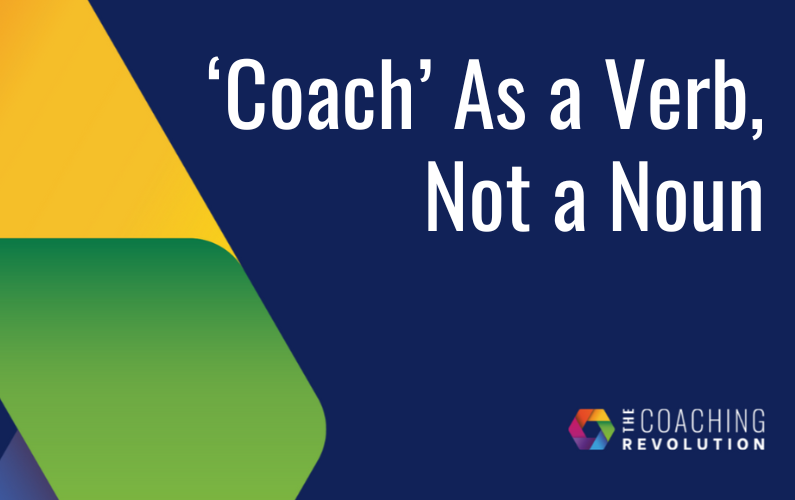Most coaches introduce themselves with the words I’m a coach. I think that mistake is costing us dearly as a profession.
It’s not that the coaching profession is broken. Coaching itself is powerful. However, the language we use to describe it is part of why many coaches struggle to find paying clients. The word coach already means something to most people, and what it means is wrong from our perspective. It brings to mind sports, instruction, expertise, and advice, none of which apply to professional coaching as we practise it.
When we present coach as a job title, we invite confusion. People ask what topic we coach on. We try to explain the process. They glaze over. We walk away frustrated and misunderstood.
Here’s the shift that can change everything. Stop using coach as a noun and start using it as a verb.
To coach is something you do in the service of a client. It’s one of the tools in your professional toolkit. You don’t need to be a coach any more than you need to be a whiteboard. The moment you drop the identity and treat coaching as an activity, your business becomes easier to describe, easier to market, and easier to grow.
The Word That Trips Us Up
Before Thomas Leonard co-opted the word, coach already had a clear and well-understood meaning. It meant someone who helps you win by telling you what to do. Coaching, as we practise it today, is almost the opposite. It’s non-directive, client-led, and about helping people think, not telling them what to think.
So when we introduce ourselves with the job title coach, we activate the wrong mental model in the listener. They expect advice. When we offer reflection, they disengage. We then feel compelled to explain, which quickly becomes a lecture on the coaching process.
Here’s the thing.
No one buys a process. They buy outcomes. That’s why this linguistic trap matters.
Identity or Activity?
Using coach as a noun turns it into an identity – something to protect, something to overthink, something that must constantly be proven. No wonder coaches get stuck.
Using coach as a verb makes it an activity. Something you do in service of the client. It’s a tool that you can use. It becomes just one of the skills in your professional toolkit alongside (perhaps) mentoring, training, consulting, or facilitation.
When coaching is an activity, not an identity, your ego isn’t on the line. Your business becomes more flexible, your marketing becomes clearer, and your chances of getting paid increase.
What Clients Hear (And Why It Matters)
Here’s what typically happens:
- You: I’m a coach.
- Them: Oh great! What do you coach people on?
- You: Well, it depends… I work with people to help them discover their goals and overcome their limiting beliefs…
- Them: [Glazed look. Quiet regret. Makes mental note to avoid you next time.]
This scene plays out at networking events around the world. We think the problem is that they don’t understand coaching. But the real problem is that we used a word that invites misunderstanding.
If you respond with a Golden Sentence* instead, they immediately know what you do. You’re not leading with your identity. You’re leading with the value you provide.
Portfolio Thinking and Joined-Up Business
The ICF Global Coaching Study 2023 found that 93% of coaches have portfolio businesses. They don’t just coach. They train, consult, mentor, and facilitate, often for the same type of client.
But when a coach sees coach as their whole identity, they split their work into silos. They have a coaching business, a consulting business, and a training business, and often, none of them seems to work well together.
If instead you see coaching as a verb (a skill, not an identity) you can start to see yourself as the business. You market one joined-up offer to one kind of client, in one voice. You become easier to understand, easier to hire and – very importantly – easier to recommend.
The Liberation of Letting Go
The shift from noun to verb is liberating!
- You stop explaining coaching and start talking about outcomes.
- You stop defending a misunderstood job title and start offering a valuable service.
- You stop trying to define yourself to other coaches and start attracting clients who need what you do.
Letting go of “I am a coach” frees you to build a real business.
Let Coaching Serve You, Not Define You
The coaching process is powerful but the word coach is getting in the way.
Drop the noun. Use the verb. Let coaching be something you do, not something you are. Then build a business around the people you want to help, the outcomes they care about, and the skills you bring to the table.
You don’t need to be a coach. You need to coach well.
That shift in language might be the shift that sets your business free.
*This is a Golden Sentence: I work with [X] to help them [Y] so that they can [Z].
X = the kind of client you work with.
Y = the problem they have (that your coaching can help them overcome).
Z = the outcome they want.

Recent Comments